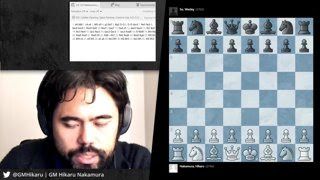Oh, gosh, two of my favorite things are in the news together: Twitch and chess.
Just kidding. I
barely know what Twitch is, and the last time I played chess was, well, not in
this century (and, even then, not well).
But I’m not kidding about their convergence. Chess has become a big hit on Twitch,
especially in these COVID times.
I figure, if two such seemingly divergent things are meshing, there must be some lessons there, even for healthcare.
For those of you over, say, fifty, Twitch is an online service that facilitates
livestreaming, particularly of gaming.
That is, people watch other people playing games, such Fortnite or League
of Legends.
E-sports, as this is known, have become a big thing;
colleges are even giving
out scholarships for e-sports. Major news outlets, such as The New York
Times and The
Washington Post, reported on Twitch re-signing video game star Tyler Blevins,
a.k.a “Ninja,” much as they might have reported an NFL team signing a star
player.
Some of those livestreams
are watching chess. Analytics website Sullygnome reports people watched 45 million
hours of chess on Twitter in 2020. In
June an amateur chess tournament was (briefly) the top-viewed Twitch stream. The
convergence of streaming and chess has created a “giant chess bonfire,” Marcus
Graham, Twitch’s head of creator development, told
The New York Times.
The biggest Twitch chess star
is grandmaster Hikaru Nakamura, who accounted
for 10 million of those 45 million hours watched. Last month esports organization Team SoloMid signed
Mr. Nakamura to what is believed to be a six figure deal; he is not the only
chess player signing such deals, nor is it the only such organization signing
them. Other key players include Alexandra Botez, Eric Hansen, and Felix “xQc” Lengyel (who is more famous for other games).
Mr. Nakamura has over 500,000 Twitch followers, drawn as much by how he engages viewers as his chess expertise. “He draws people because he’s so good, but also, there are other top players on Twitch that are not as engaging as he is, not as funny, not as in tune with the sort of Twitch culture,” one viewer told The Times.
Mr. Nakamura’s appeal is, in part, because he helps demystify the game; “Fans love when he loses his mind at a poorly thought-out move.” One fan told The Times:
When I was growing up, high-level chess was secreted behind closed doors, played by the privileged, moneyed people in society. Realizing that I could see chess being played at the highest levels and seeing the players on Twitch communicate their thoughts with the community really resonated with me.
In an interview
with NPR. Mr. Nakamura acknowledged the conflict: “So
there are people who feel very much that chess, as it is, should stay that way
as opposed to, say, in a sense cheapening the game by trying to make it more
popular.” His goal is to help break down
those barriers.
As The Times asked, “If Serena Williams and Usain Bolt showed off their unique
abilities every day on a livestream, wouldn’t you watch?”
Lest we think this is entirely
about Twitch, I’ll point out that Chess.com is the world’s
third largest gaming website, with 42 million members and an average of
over 9 million regular viewers. It
claims to be adding over 1 million users per month. Chess is adapting to the times.
Twitch isn’t just focused on games, much less on chess. It has signed musicians and other creators. It livestreams sports and concerts. It uses its connection to Amazon Prime to host Watch Parties, so users can “watch, react, and discuss any movie or TV show that is available with their Amazon Prime or Prime Video subscription, directly on Twitch.” YouTube and Netflix should be worried.
I actually wrote about Twitch several years ago, just after Amazon acquired it for close to a billion dollars, noting at the time:
I'll posit this: if you didn't know what Twitch was, or are still puzzled at its appeal, your organization is going to have a tough time competing over the next couple of decades.
That’s even more true
today than ever.
As with TikTok, Twitch
users are
predominately young. Forty-one
percent of its users are 16-24, with another 32% 25-34. Only 3% are 55-64; users over 65 don’t even
count as a rounding error. It is the
converse of our healthcare system’s current users, but it is the generational
wave that is coming.
I’ve written before
about how healthcare has lessons to learn from disparate platforms like TikTok
or Fortnite,
as those platforms have extended their reach (e.g., social justice and the
Metaverse, respectively). As best I can
tell, Twitch hasn’t paid any attention to health or healthcare. Then, again, gaming/gamification are
still struggling to gain a foothold in healthcare.
Healthcare likes its
traditions – white
coats, anyone? – and claims to value our privacy so much that it often
makes it hard for us or our caregivers to get access to our information. “Games” or livestreaming to a participatory
audience seems like the remotest thing for healthcare.
But if the staid,
traditional-laden of chess can thrive in a Twitch environment, there have to be
ways that healthcare can take advantage of it as well. Too much of what goes in healthcare is “secreted
behind closed doors,” as the one chess fan said about chess. We need to open those doors.
I’m not talking about
easy uses like yoga classes or even medical lectures; I’m talking about more
things like livestreaming surgeries, as Tokyo Women’s Medical University does
– in VR. COVID-19 is
prompting some medical schools to do the same. There are uses we have not yet thought of,
but should. It just probably won’t be healthcare’s
largely Baby Boomer leadership that will come up with them.
What healthcare
organization or professional will have the first breakout Twitch channel?




No comments:
Post a Comment